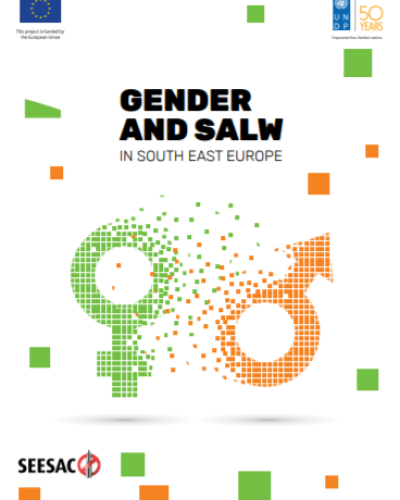Gender and SALW in South East Europe

The large scale and uncontrolled proliferation of small arms and light weapons (SALW) has been widely recognized as presenting a serious threat to citizen security, fuelling crime and instability and negatively affecting social and economic development. This has been particularly true in South East Europe (SEE).
Since 2002, through the South Eastern and Eastern Europe Clearinghouse for the Control of Small Arms and Light Weapons (SEESAC), UNDP has been supporting efforts to counter this threat by developing legislative and policy frameworks and the establishment and capacitation of institutional mechanisms. The policy support work in particular has become increasingly sophisticated in line with the needs of stakeholders in the region.
While significant progress has been achieved, the integration of the gender perspective is lagging behind and has still not become an integral part of strategies employed to address the causes and consequences of SALW proliferation. Despite numerous commitments at the global and national level, this challenge has only been marginally tackled in the ongoing SALW control efforts. Still, if our gender glasses are on, then it is hard to imagine an issue more gendered than the use and misuse of SALW.
In SEE, as elsewhere, men are the overwhelming majority of those who possess firearms, who use and, often, misuse them. They account for the majority of both perpetrators and victims of firearm related incidents. When they are victims, they are most often murdered by other men. But SALW also has adverse effects on the security and wellbeing of women. Women seldom own a gun, hardly ever use it and, unlike men, they are much more often victims than perpetrators. This is particularly staggering in the context of domestic violence. Most of the gun violence against women is committed by current or former partners and the presence of a firearm dramatically increases the likelihood of the lethal outcome. Consequently, women are more likely to see the presence of firearms as a threat to their own and their families’ security.
It is striking how policies regulating SALW control are still silent about these linkages and fail to acknowledge that some security concerns affect women and men in different ways. The present report shows that the gender perspective is neither recognized nor adequately addressed by legislative and policy frameworks regulating SALW control in SEE, making these efforts less efficient in providing security for all citizens, whether women, men, girls or boys - hindering the achievement of Sustainable Development Goals 5 (on gender equality) and 16 (on peace, justice and strong institutions).


